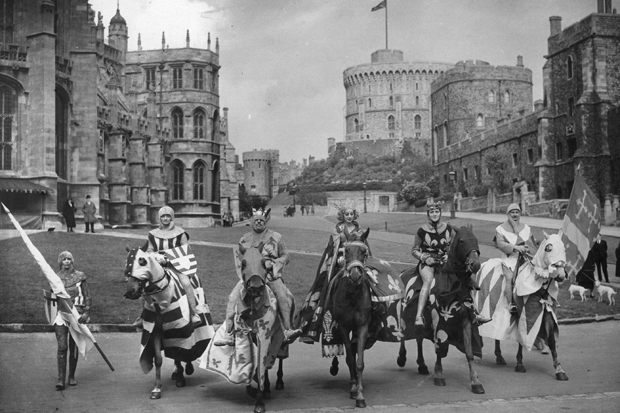Here is a stupendous achievement: a narrative history of England which is both thorough and arresting. Very few writers could pull it off. Either they’d have an axe to grind, or they’d lose perspective, or they’d present a series of anecdotes, or they’d end up in a Casaubonish pursuit of other historians’ errors. In fact, to get it right, you’d ideally be a mature and accomplished author, steeped in the facts, who was nonetheless tackling English history for the first time.
Which is more or less what Robert Tombs, a professor of French history at Cambridge, is. ‘A writer of history ought, in his writings, to be a foreigner, without country, living under his own law only,’ claimed Thomas Hobbes, adapting Lucian. If you’ve read any modern French history in English, the chances are you’ll have come across Tombs. This book, though, will be remembered as his magnum opus.
The English and their History is about as long as a single volume can be; yet it couldn’t really be any shorter. To be honest, like many reviewers on a deadline, I had planned to skip bits of it; but found myself gripped by the narrative. Nothing important is omitted, there are no howlers, and yet plenty of myths are gently corrected — especially those surrounding the first world war. ‘A few lines of Wilfred Owen outweigh a shelf of monographs,’ as the author drily notes.
Tombs plays a straight bat. He isn’t trying to make his name with a clever-dick new thesis. Rather, he draws on the latest research to give us something close to a comprehensive picture. The civil war was neither a social revolution nor a Whig triumph, but an avoidable breakdown (an analysis which reflects the current scholarly consensus, and which is remarkably close to David Hume’s take in the 18th century). The American Revolution had more to do with the Quebec Act, which recognised the traditional rights of the Catholic church in Canada, than with the Stamp Act. High Tories in the 19th century were closer to modern sensibilities on many issues — notably welfare — than their Liberal opponents. Imperial expansion was more reluctant than we like to remember: plenty of conquered territories were immediately handed back, and ‘requests from the inhabitants of Ethiopia, Mexico, Uruguay, Sarawak, Katanga and Morocco to join the empire were firmly turned down’.
As for the declinism which dominated our post-war thinking, a few well-chosen economic statistics show how utterly misplaced it was. ‘It is commonly said that Britain joined the Common Market too late,’ writes Tombs perspicaciously. ‘Perhaps, on the contrary, it joined too early — just before the European economies entered a period of stagnation, and before it had faced up to its own economic shortcomings.’
This kind of history is sometimes called conservative, in the sense that it isn’t advancing any ideological agenda. In fact, though, it’s remarkably balanced. To give just one example, Tombs lays out in full the atrocious human cost of the RAF’s bombing raids on Germany, then astutely points out that the moral dilemma is all the more painful precisely because the raids were effective.
All of us, inevitably, will disagree with something or other. Tombs has fallen, as contemporaries did, for Charles II’s unaffected charm, and passes over that king’s stunning lack of patriotism. And he is far too kind to the lamentable Lord North.
But the power of this book is in its sweep, its ambition and its perspective. Lloyd George was the first plebeian to rise to the highest office since Thomas Cromwell. Margaret Thatcher divided the nation as no prime minister since Peel.
You sense the solidity of the subject matter: the English dealt as phlegmatically with the Black Death, avoiding the millenarian enthusiasms of contemporary Europeans, as they were later to deal with the Blitz. The distrust of central government is a constant, animating the Country Party of the 18th century as it animates Ukip.
There are beautiful passages about English literature — Tyndale, Shakespeare and Cranmer, obviously, but also a lot of Defoe — as well as on historiography. ‘Getting your history wrong is part of what makes a nation,’ observed the 19th-century French writer Ernest Renan — whom Tombs quotes frequently, although not that line.
Why England? Because, although it was a sovereign and separate state only very briefly — between Alfred and Cnut — it is the obvious historical unit. The logical approach, unless you’re trying to be over-clever, is to tell England’s story until the 17th century, and then introduce the wider British and imperial contexts — though Tombs correctly points out that the British empire loomed larger in foreign than in English minds.
What emerges is the story of a people we can’t fail to recognise: stoical, brave, drunken, bloody-minded, violent, undeferential, yet paradoxically law-abiding. It’s a fine and honest account, and you’ll feel more patriotic after reading it.
Got something to add? Join the discussion and comment below.
Get 10 issues for just $10
Subscribe to The Spectator Australia today for the next 10 magazine issues, plus full online access, for just $10.
Available from the Spectator Bookshop, £29 Tel: 08430 600033
You might disagree with half of it, but you’ll enjoy reading all of it. Try your first month for free, then just $2 a week for the remainder of your first year.














Comments
Don't miss out
Join the conversation with other Spectator Australia readers. Subscribe to leave a comment.
SUBSCRIBEAlready a subscriber? Log in